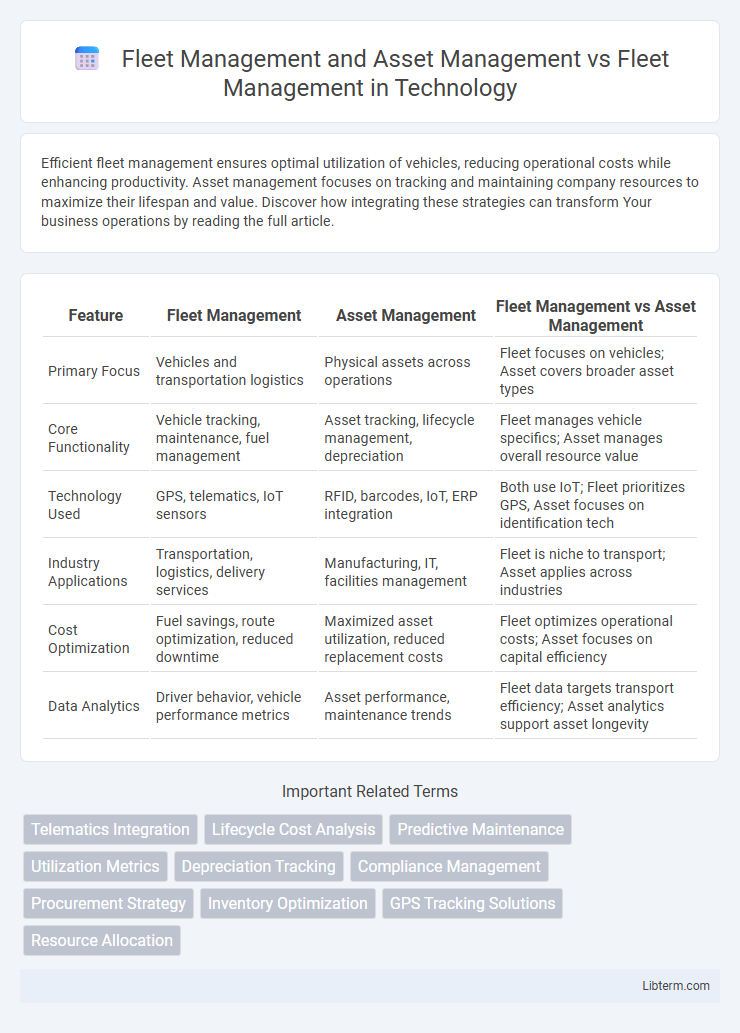Efficient fleet management ensures optimal utilization of vehicles, reducing operational costs while enhancing productivity. Asset management focuses on tracking and maintaining company resources to maximize their lifespan and value. Discover how integrating these strategies can transform Your business operations by reading the full article.
Table of Comparison
| Feature | Fleet Management | Asset Management | Fleet Management vs Asset Management |
|---|---|---|---|
| Primary Focus | Vehicles and transportation logistics | Physical assets across operations | Fleet focuses on vehicles; Asset covers broader asset types |
| Core Functionality | Vehicle tracking, maintenance, fuel management | Asset tracking, lifecycle management, depreciation | Fleet manages vehicle specifics; Asset manages overall resource value |
| Technology Used | GPS, telematics, IoT sensors | RFID, barcodes, IoT, ERP integration | Both use IoT; Fleet prioritizes GPS, Asset focuses on identification tech |
| Industry Applications | Transportation, logistics, delivery services | Manufacturing, IT, facilities management | Fleet is niche to transport; Asset applies across industries |
| Cost Optimization | Fuel savings, route optimization, reduced downtime | Maximized asset utilization, reduced replacement costs | Fleet optimizes operational costs; Asset focuses on capital efficiency |
| Data Analytics | Driver behavior, vehicle performance metrics | Asset performance, maintenance trends | Fleet data targets transport efficiency; Asset analytics support asset longevity |
Introduction to Fleet Management
Fleet Management involves overseeing a company's vehicle operations to maximize efficiency, safety, and compliance. Unlike Asset Management, which covers a broader range of physical and financial assets, Fleet Management specifically targets vehicles, focusing on maintenance, tracking, and cost control. Effective Fleet Management employs telematics, GPS tracking, and data analytics to optimize route planning and reduce operational expenses.
What is Asset Management?
Asset Management involves the strategic oversight and maintenance of physical assets, encompassing not only vehicles but also equipment, infrastructure, and technology, to maximize their value and lifecycle. Fleet Management is a subset focused specifically on managing vehicle fleets, including acquisition, maintenance, tracking, and compliance. Effective Asset Management integrates data analytics and lifecycle cost analysis to optimize asset utilization and reduce operational costs across an organization.
Fleet Management vs Asset Management: Key Differences
Fleet management focuses exclusively on optimizing the use, maintenance, and tracking of vehicles within a company's transportation operations, incorporating fuel management, driver performance, and route planning. Asset management encompasses a broader scope, including all physical assets such as machinery, equipment, and property, emphasizing lifecycle management, depreciation, and investment strategies. Key differences lie in fleet management's specialization on vehicles versus asset management's comprehensive approach to managing diverse asset types for operational efficiency and cost control.
Overlapping Functions in Fleet and Asset Management
Fleet management and asset management share overlapping functions such as tracking asset utilization, maintenance scheduling, and lifecycle cost analysis, which ensure operational efficiency and cost control. Both disciplines utilize GPS tracking, telematics, and predictive analytics to monitor performance and optimize resource allocation across vehicles and other assets. Integration of these functions fosters improved decision-making by providing comprehensive data on asset availability, condition, and depreciation.
Core Benefits of Fleet Management
Fleet Management optimizes vehicle utilization, reduces operational costs, and enhances driver safety through real-time tracking, maintenance scheduling, and fuel management systems. Unlike Asset Management, which broadly handles various company resources, Fleet Management specifically focuses on improving fleet efficiency, compliance, and lifecycle management. Key benefits include increased productivity, lower downtime, and improved regulatory compliance for transportation and logistics companies.
Core Benefits of Asset Management
Asset management in fleet management enhances the visibility and control of physical assets, optimizing their utilization and extending their lifespan through predictive maintenance and real-time tracking. It reduces total cost of ownership by preventing downtime and enabling data-driven decision-making for asset allocation and replacement. These core benefits streamline operations and improve return on investment beyond traditional fleet management focused primarily on vehicle scheduling and maintenance.
Integration of Fleet and Asset Management Systems
Integration of Fleet and Asset Management Systems enhances operational efficiency by providing real-time visibility into both vehicle utilization and asset status, enabling proactive maintenance scheduling and resource allocation. This unified approach reduces downtime and improves asset lifecycle management through synchronized data exchange and centralized reporting tools. Companies leveraging integrated solutions benefit from streamlined workflows, cost savings, and improved decision-making based on comprehensive analytics of fleet and asset performance.
Industry Use Cases: Fleet Management vs Asset Management
Fleet management focuses on the efficient operation and maintenance of transportation vehicles within industries such as logistics, delivery, and construction, optimizing routes, fuel consumption, and driver performance. Asset management encompasses a broader scope, tracking and maintaining physical assets like machinery, equipment, and infrastructure in sectors such as manufacturing, utilities, and healthcare to maximize asset lifespan and reduce downtime. Industry use cases highlight fleet management's role in mobile asset tracking and compliance, while asset management emphasizes lifecycle management and predictive maintenance across diverse assets beyond vehicles.
Choosing the Right Solution for Your Business
Choosing the right solution for your business depends on whether you need comprehensive oversight of all assets or a specialized focus on vehicle operations. Fleet Management primarily targets the efficient scheduling, maintenance, and tracking of vehicles, reducing operational costs and maximizing fleet utilization. In contrast, Asset Management integrates broader organizational asset tracking beyond vehicles, optimizing asset life cycles and overall resource allocation to enhance operational efficiency.
Future Trends in Fleet and Asset Management
Future trends in fleet and asset management emphasize integration with IoT and AI technologies to enhance real-time monitoring, predictive maintenance, and operational efficiency. Advanced analytics and telematics enable proactive decision-making, reducing downtime and optimizing asset utilization across diverse industries. The convergence of fleet management and asset management systems supports comprehensive lifecycle tracking and sustainability initiatives, driving cost savings and improved compliance.
Fleet Management and Asset Management Infographic

 libterm.com
libterm.com